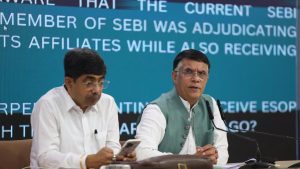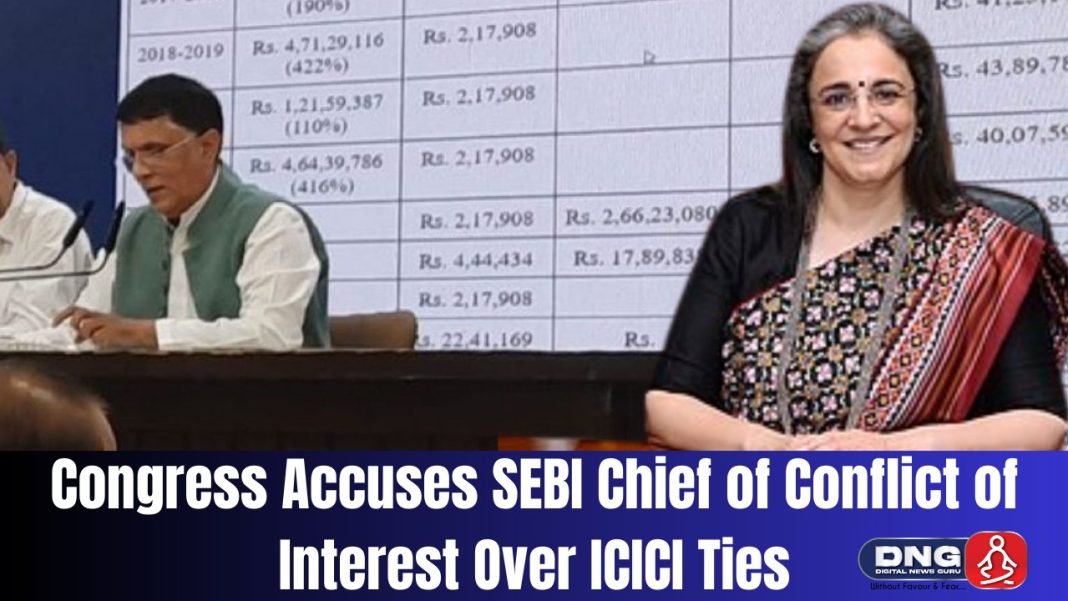DIGITAL NEWS GURU DELHI DESK:
Congress Accuses SEBI Chief of Conflict of Interest Over ICICI Ties.
The latest developments involving the Securities and Exchange Board of India (SEBI) Chairperson Madhabi Puri Buch have sparked significant controversy and political debate in India.
The Congress Party has raised serious allegations against Buch, focusing on potential conflicts of interest stemming from her previous role at ICICI Bank, one of India’s largest private-sector banks.
These accusations come at a time when India’s regulatory bodies are under intense scrutiny, particularly in the wake of earlier controversies such as the Adani Group saga, which questioned the effectiveness and independence of financial regulators in the country.
The Allegations

The Congress Party’s allegations against SEBI Chairperson Madhabi Puri Buch center around her past professional ties with ICICI Bank, where she held a high-ranking position before joining SEBI.
The party has raised concerns that Buch continued to receive financial benefits from ICICI Bank even after she took on the role of SEBI Chairperson, which they claim could constitute a conflict of interest. According to the Congress, Buch’s acceptance of salary payments and Employee Stock Ownership Plans (ESOPs) from ICICI Bank while serving as SEBI Chairperson compromises her impartiality, especially in regulatory matters that could involve her former employer.
Pavan Khera, a prominent spokesperson for the Congress Party, has been vocal in demanding an immediate investigation into these allegations. The Congress has argued that Buch’s financial dealings with ICICI Bank after assuming her regulatory role create a perception of bias, which could undermine public confidence in SEBI’s ability to act independently and fairly.
Political Ramifications
This controversy has significant political implications, as it plays into the broader narrative of regulatory capture that the Congress Party has been pushing against the current government. The party has long criticized what it sees as the erosion of regulatory independence under the administration of Prime Minister Narendra Modi. The allegations against Buch provide the Congress with a fresh opportunity to question the government’s commitment to maintaining the integrity of India’s regulatory institutions.
The timing of these allegations is also noteworthy. They come on the heels of the Hindenburg Research report, which accused the Adani Group of financial misconduct and raised questions about SEBI’s oversight of the conglomerate. The Congress has sought to link the issues, suggesting that the allegations against Buch are part of a broader pattern of regulatory failure under the current government.
SEBI’s Response and Broader Context
As of now, SEBI has not issued a detailed public response to the Congress’s allegations. However, sources close to Buch have indicated that the payments from ICICI Bank were part of her retirement benefits, which is a standard practice for executives leaving a corporation. This explanation might address the legality of the payments, but it does little to quell the political storm that has been brewing.

The controversy also brings into focus the broader challenges faced by regulatory bodies like SEBI. The independence of such institutions is crucial for the proper functioning of financial markets, but maintaining that independence in a highly politicized environment can be difficult. The perception of bias, even if unfounded, can erode public trust in these institutions, which is essential for their effective functioning.
This situation is reminiscent of earlier debates about the role and independence of regulators in India. Over the past few years, there has been growing concern that regulatory bodies are increasingly subject to political pressure, which could compromise their ability to enforce laws and regulations impartially. The Congress’s allegations against Buch add fuel to these concerns, suggesting that even senior officials at the highest levels of regulatory authority are not immune to potential conflicts of interest.
The Impact on SEBI and Financial Regulation

The allegations against Buch, whether substantiated or not, could have far-reaching implications for SEBI and financial regulation in India. If the controversy continues to grow, it could lead to greater scrutiny of SEBI’s operations and possibly even result in calls for reform. In the short term, the controversy may impact SEBI’s ability to carry out its regulatory duties, as public trust in the institution could be weakened.
Moreover, this situation highlights the need for greater transparency and accountability in the functioning of India’s regulatory bodies. The Congress Party has called for a thorough investigation into Buch’s financial dealings, and if such an investigation is launched, it could lead to broader discussions about how to ensure that regulators remain free from conflicts of interest. Such discussions could, in turn, lead to policy changes aimed at strengthening the independence of regulatory institutions in India.
Conclusion

The controversy surrounding SEBI Chairperson Madhabi Puri Buch is a significant development in the ongoing debate about regulatory oversight in India. The Congress Party’s allegations have brought to the forefront concerns about potential conflicts of interest within India’s regulatory bodies and have raised important questions about the independence of these institutions. As the situation unfolds, it will be crucial to monitor how SEBI and the government respond to these allegations, as well as how this controversy might influence future regulatory practices in the country.
In the broader context, this controversy serves as a reminder of the critical importance of maintaining the integrity and independence of regulatory bodies in a complex and rapidly growing economy like India’s. The resolution of this issue could have lasting implications for how financial markets are regulated in the country and for the public’s trust in the institutions that oversee them.
YOU MAY ALSO READ: Wolf Attacks Terrorize Uttar Pradesh’s Bahraich








